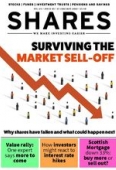Investors may be wary of putting fresh money to work within the emerging market region given its recent poor showing.
The performance of the benchmark MSCI Emerging Markets index on a one-year basis is -6.2%.
Nonetheless from a longer time perspective, a very different picture emerges. On a three, five and 10-year basis the index has generated returns of 24.7%, 41.6% and 83.1% respectively.
Moreover several funds have succeeded in outperforming the benchmark return on a longer term basis.

These include Baillie Gifford Emerging Markets Leading Companies Fund (B06HZN2) and Baillie Gifford Emerging Markets Growth Fund (0602064).
In addition the Fidelity Institutional Emerging Markets Fund (B9SMK77), and the Goldman Sachs Emerging Markets Equity Portfolio (BYZWWN5) have also demonstrated a strong track record of outperformance.
Baillie Gifford Emerging Markets Leading Companies is managed by Will Sutcliffe one of the more experienced fund managers in this field, and adopts a long-term approach.
China is Sutcliffe’s largest individual country exposure accounting for 30.5% of his fund’s allocation, followed by South Korea and India, both at 13.8%.
Financials and technology stocks account for more than half of his fund’s allocation and include semiconductor manufacturer TSMC and Chinese conglomerate Alibaba.
Despite having a different fund manager in Andrew Stobart, Baillie Gifford Emerging Markets Growth is a near replica of the Leading Companies fund, with respect to country weightings and top equity holdings.
China ranks number six on the list of country allocations in Fidelity Emerging Markets with a 4.5% weighting.
Fund managers Nick Price and Amit Goel have a broader geographic spread with Taiwan, South Korea, Kazakhstan, Russia and India all receiving more significant allocations. The fund typically looks to buy mid and large cap stocks with market values in excess of $1 billion.
Fund managers Basak Yavuz and Hiren Dasani run the Goldman Sachs Emerging Markets Equity Portfolio, and they share an enthusiasm for China, with a 28.9% country allocation.
‹ Previous2022-01-27Next ›

 magazine
magazine









